How many thoughts, really, are of our own making these days? And does it really matter anymore?
By Margaret Lindsay Holton
Published May 13, 2015
'What does a fish know about the water in which he swims all his life?'
—Albert Einstein
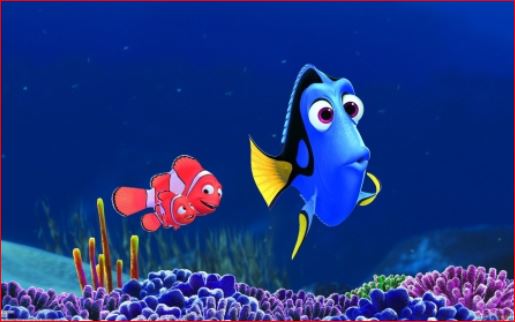
The purpose of this informal essay is to: first, broadly explore the impact that television has had on our lives; and second, stimulate thought about the influence and continued evolution of our brains as we 'tune in' to screens on a daily basis.
Example 1. About 25 years ago, friends and I were raking and adding leaves to a bonfire at the farm when their six-year-old child turned to me and said, "Wow! That fire is just like a fire in New York City!"
It was immediately evident that this child had never experienced a 'bonfire' in his tiny perfect life, (let alone ever left the country, let alone the province.) His only way to understand and assimilate the actual bonfire was to reference it to something he had previously seen on television. His first memory of a "big fire" was via television.
Tangentially, consider that a North American child, on average, will watch, at minimum, 8,000 acts of violence on a screen by the time they reach elementary school. That seemingly passive consumption of violence is known to actively reduce their cognitive brain function abilities.
By the time they are teens, their minds will react to screen violence as illustrated by the diagram below. This cognitive brain function reduction will subsequently impact their adult behaviour - and, some have argued, their potential child-rearing capabilities. It seems reasonable to suggest that when 'violence' becomes the accepted visual 'norm', we can't expect to have well-adjusted peaceful children.
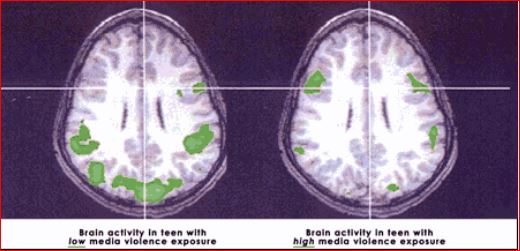
Teen brain activity during low and high 'violence' video game exposure
Example 2. Recently, I was having lunch with a younger friend, age 35, and I mentioned how he reminded me of the actor Paul Newman as a young man. He had no idea who I was talking about.
I was struck again how screen time both establishes memories and, equally, isolates us. My friend, in turn, mentioned a screen reference, an actor, from his life that I had no clue about. Evidently, these cultural references have little enduring resonance beyond the spheres of our own specific age group.
How is it that our media exposure has become so isolating?
Television slowly entered mainstream North American culture during the late 1940s. Those born after that decade were likely to have had at least one television in their homes as children.
Today, for simplicity's sake, I've broken down screen watchers into decades, marked by ten-year-intervals representative of 'our childhood' when television impacts us more then we think.
So, those alive when television entered the mainstream, who predate 1940, I call the Pre-TV generation. The 1st generation, after that, are those born in the 1950s; 2nd gen are those born in the 1960s; 3rd gen were born in the 1970s, and so on.
Today, using this decade model, we are currently in the 7th generation of television watchers. As I write this now, millions of children at five years of age are sitting, likely alone, watching television somewhere, on their parents' or neighbours' TV sets or increasingly on their parents computers or other home devices.
Make no mistake, that passive experience is not only shaping their brains, but imprinting multiple 'first memories' into their eager all-consuming growing minds.
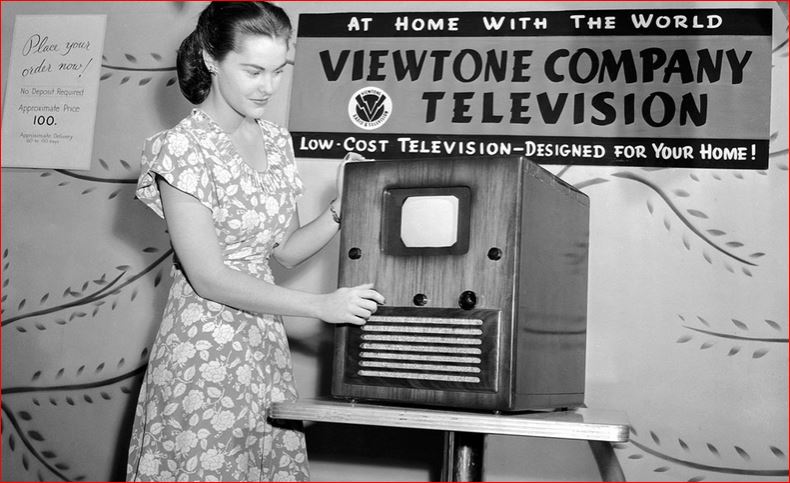
Post-WW2, 1945, television receiver with 5x7 screen sold for $100. (AP Photo/Ed Ford)
In 1950, less then 9 percent of North American homes had a television. But by 1956, more then 70 percent of American homes had at least one black and white TV.
Elvis Presley, first heard on radio, made his television debut in January 1956.
The Beatles launched in North America nine years later, in February 1964, on the Ed Sullivan Show, inducing a nation-wide "Beatlemania". They also appeared on the cover of Time magazine.
At that point, 94 percent of Americans owned a television set and that particular program was watched by a record-setting 73 million, or 60 percent of the viewing public, according to Nielsen TV Ratings.
In February of 2015, Kanye West and Rihanna, two current pop music stars, released a new music video on YouTube. It had an older guy playing guitar along with them.
Social media via Twitter, Facebook, Instagram and Tumblr, accessed mainly by hand-held screen devices, exploded around this 3+ minute mini-media event.
Many thought it was generous of those two performers to give that old geezer a boost to his relatively unknown career. That older fellow rocking the guitar was Paul McCartney, formerly of The Beatles. That clip has since been seen by nearly 2 billion global screen watchers - on just Youtube alone, a Google-owned company.
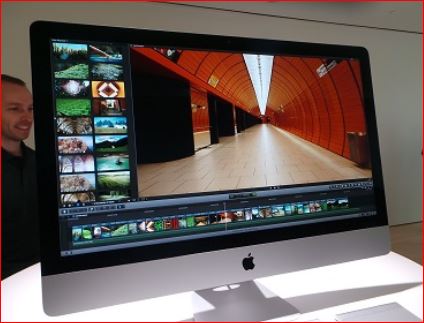
An Apple iMac: 'You've come a long way sister!'
Today, the 6th generation of TV watchers, those born after 2000, are undeniably bound to screens whether at home, school or work. Digital literacy is now mandatory, though, oddly, "digital media" as a subject is rarely studied or taught in elementary schools.
Rather, it is "accessed" by educators long after initial contact has occurred at home. Tech/Comm, as a study area, generally begins in high school, after children have been fully immersed in these mind-altering technologies for at least a decade.
Billions of minutes of infotainment are now beamed into our spaces daily. It's there for the picking, the choosing, the mash-up editing, the arguments, the fanning, the dissecting, and yes, the sharing. Yet, very few from this 6th generation have any inkling of the TV-free formative years of their predecessors, many of whom are still alive today.
Those now living in their 70s and 80s did not have television in their homes as youngsters. A few had radios, but there were definitely no screens. Once this generation of seniors die, there will be virtually no television virgins left on the planet. Our species is in the process of losing this pre-TV link forever.
As a 2nd generation TV child, Canadian artist Douglas Coupland, born 1961, amplified this idea with his seminal art poster: "I miss my pre-internet brain". He never could have said that about television because he never experienced a TV-free childhood environment.
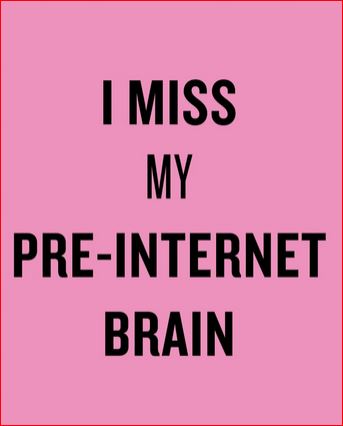
Thus, it is near impossible now for us to imagine a time when our collective minds were ever TV-free.
To further consider and understand this transformative and explosive evolution, I've engaged with two thought-provoking individuals to contrast their generational perspectives about how it once was, and how it now is.
I've chosen one from the pre-TV generation, and one from the 3rd generation, with myself as a 1st gen provocateur. Later generations, especially those born after 1990 - if they are even reading this on their smart phones, which, sadly, is highly unlikely - are more than welcome to engage with their insights and perspectives in the comment section below.
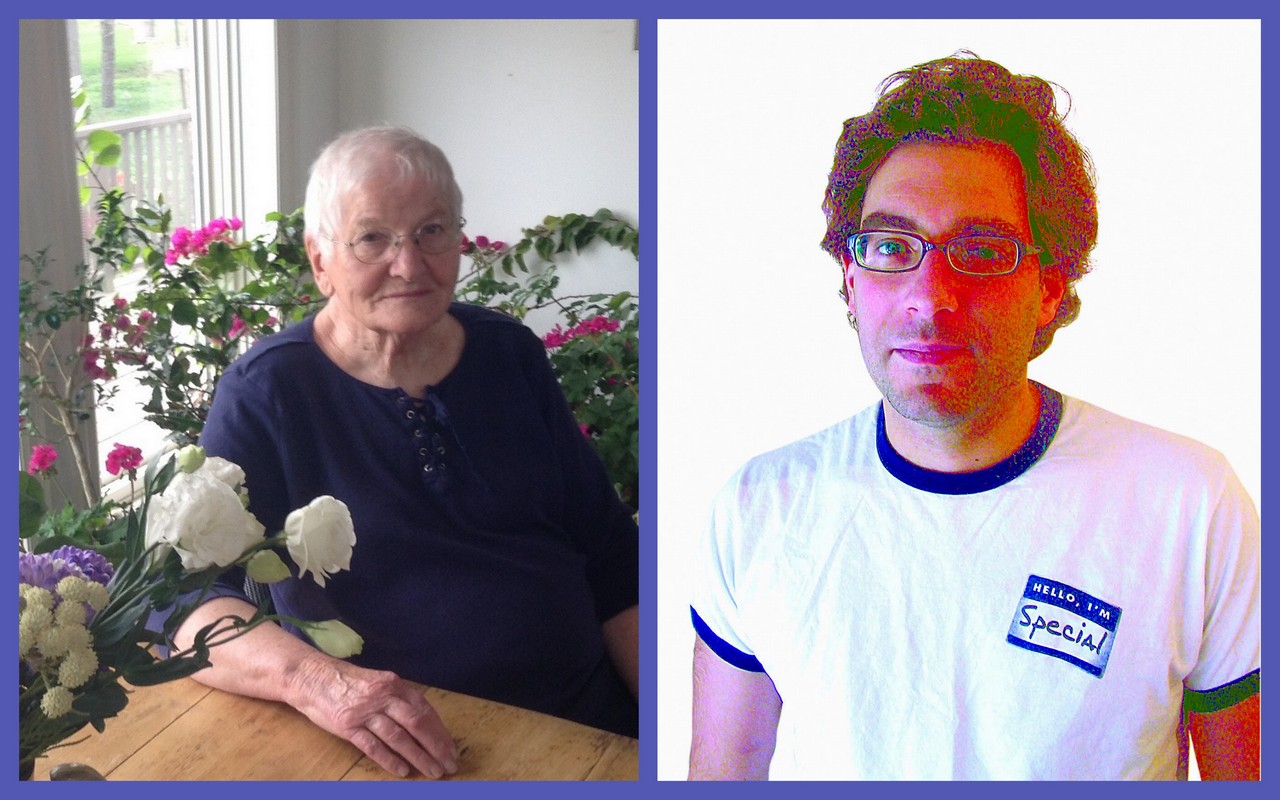
Sybil Rampen, 84, and Hal Nziedvicki, 44
Sybil Rampen, now 84 and pre-TV, is founder of the Joshua Creek Heritage Art Centre in North Oakville. She recounts how television was not in her home until well into the 1960s. Curiously, she married a CBC television producer.
In contrast, one of Canada's most potent digital natives, Hal Nziedvicki, now 44 and 3rd gen, is founder of online zine Broken Pencil and author of eight books, including, Along Came Tomorrow: Our Lives in the Permanent Future). He cannot recall a time when television wasn't present in his home.
I asked each to give their timely perspective of T.V. Time Past and T.V. Time Present, and have supplied those Q&A's for your consideration. As you read, think about what's been lost and what's been gained, from each generational perspective.
1. You are 84 years old, and have raised a family. Describe the current media environment of your home.
Sybil: Media - I have two computers in my office - one containing material from precious years and a current one about nine months old. One TV in bedroom. A CD player and one DVD projector and screen in the Winter Garden room. I work two to three hours a day on the computer. Watch about four hours of TV a week if that. Listen to music about eight hours a week.
2. Describe the media environment of your childhood home when you were growing up.
Sybil: My parents had a radio piece of furniture and as a child I looked behind it for the little people that were talking inside. The most impactful thing that I remember was the very emotional and sad voice of the King announcing WW2 and my father's reaction. His WW1 memories caused his collapse.
In 1955 I married a CBC TV husband but we did not have a TV until the '60s. This was a small black and white portable second-hand TV much disapproved of by my husband. The boys were only able to watch it for one hour sitting on the floor in the upstairs hall.
We built a house for my parents across the pond and had a black and white TV in their bedroom, but eventually changed this to colour. The boys often watched TV in their house after school. My mother particularly loved the nature shows and the news. My father preferred to read.
We kept the boys very busy out of doors, at the barn with the goats, playing and making things in the workshop and helping with chores. TV was extremely limited. We were a farm.
3. Can you recall the earliest programs that made the biggest impact on you? What were they?
Sybil: The CBC was the only channel we watched. Otherwise, we would look at the TV guide and pick shows that were more or less documentary or news. The boys liked children's show - Uncle Bob? Sesame Street etc.
4. Are you aware of, or have you watched any, of these popular current programs? 'House of Cards', 'Game of Thrones', 'The Vikings' or 'Mad Men'?
Sybil: Have not watched any of these.
5. As a well-educated and literate person, how would you say television informs your understanding of the world today - or is the 'internet' winning? Explain.
Sybil: One good thing about TV is that if you do not read, it is a link with the outside world - especially with the news channels, like the CBC. After a hard day's work, the 10 o'clock news and Steve Paikin on TVO and documentaries are important. David Suzuki's 'The Nature of ThIngs' is worthwhile. Most of the time when I turn on the TV, I fall asleep because I have had a very busy day.
6. When a 5th generation person, born after 1990, mentions an 'unfamiliar' experience, do you find that you immediately reference their stories to events you might have seen on TV? Example, "tattoos" = The Vikings, "digital" = The Big Bang Theory. Provide examples, if possible.
Sybil: I am unable to answer 6. Too old.
7. For the 1st and 2nd gen of TV watchers, the arrival of the Beatles to North America, the televised landing on the moon (1969), and the shooting of John F. Kennedy (1963) were seminal television news events that were not a part of your generation's early life experience. Name three televised events that do mark your life experience.
Sybil: As a child during WW2 we would pay go to the Saturday movies at the Gregory Movie house and watch Charlie Chaplin and Buck Rogers. Part of the program was the latest news of the War. Very serious and sad. In 1953 I was at the Coronation [of Queen Elizabeth] and enjoyed the TV presentations of it when I was able to see it on someone else's TV.
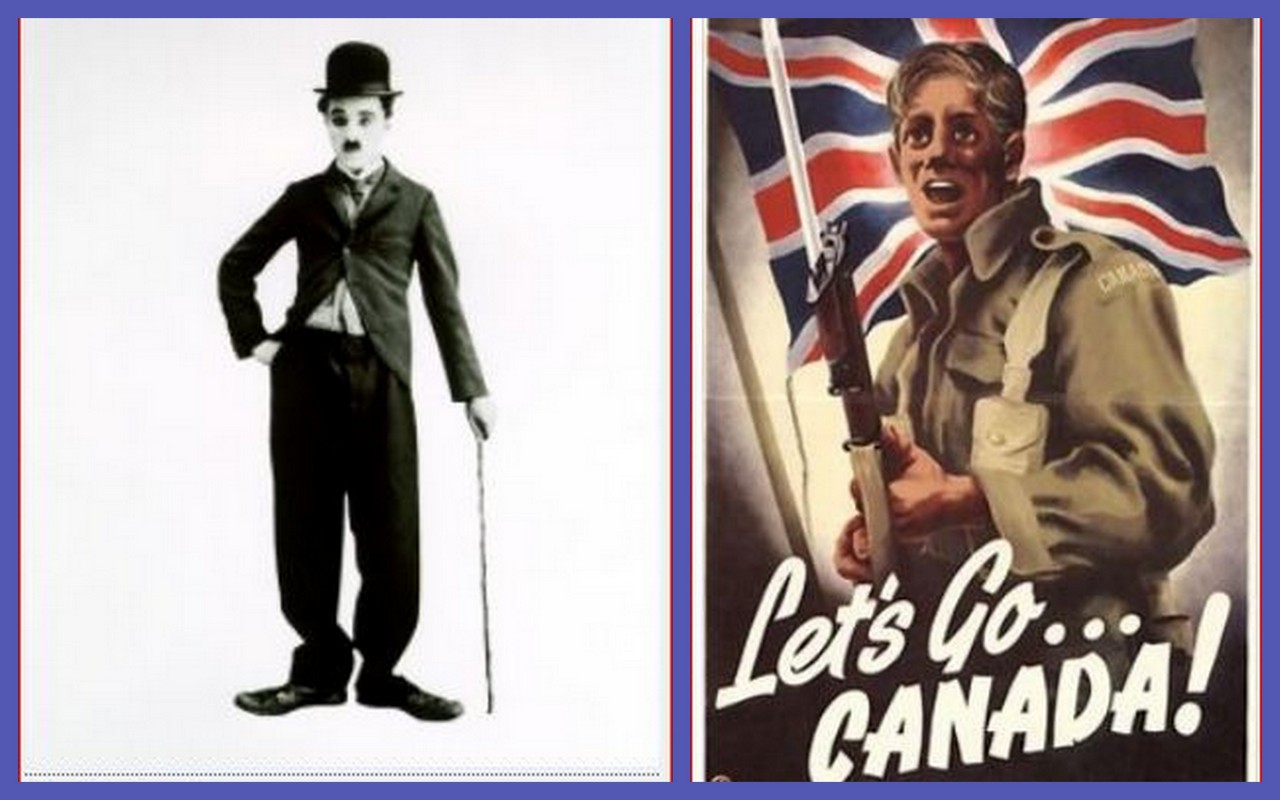
Charlie Chaplin and WW2 Propaganda
8. As a parent, what responsibility did you feel for exposing - or protecting - your children from television? Did you impose viewing restrictions? Where do you draw the line to censor? Why?
Sybil: Both my husband and I felt that a little TV was OK for the boys but that they had better things to do than sit and watch. After homework and chores were done, they were allowed a very limited time. This seems to have worked as they are all educated and well-rounded people able to use their hands as well as their heads.
9. How do you envision the 'media landscape' for your grandchildren?
Sybil: I was shocked that my young grandson, who lived with us for many months, would spend his nights playing video games from around the world and then be too tired to pitch in and help with the many requirements of the Centre. He'd only help when he was caught. I am glad to say he has moved on to become a hard-working adult.
As to the current mass use of the smart phone with all its incredible possibilities, the danger of brain cancer, from its known radiation overuse, is terrifying, as is the economical fallout. The benefit is that the youth today have more opportunity to know what is happening all over the world. They are in a world of space travel.
10. How has television shaped your memory? Explain.
Sybil: Having lived so long and experienced so many events in the world, the documentaries about them reinforce and expand earlier memories of what has happened. Understanding a great deal more about the planet, and man's position in it, is more obvious for all generations.
Kindly add any other thoughts that these questions have stimulated about your own television experiences, past or present. What else should 'we' know from your perspective as a pre-TV pioneer?
Sybil: Television, email and Skype are part of our lives now. They have a very positive influence but they also have the potential of being overused in that too many people have become couch potatoes and obese. They are watchers rather than doers.
For the disabled, TV is a boon as it takes them out of their immediate situation and entertains and enriches their lives. Busy parents can use carefully chosen TV programmes for their children.
Some shows are incredible, but it is far too easy to sit children in front of the TV and ignore what they watch. This can lead to disaster. Same with computers and the web. Properly monitored media is fabulous. If it isn't, it can be a very sad way to spend your life on Earth.
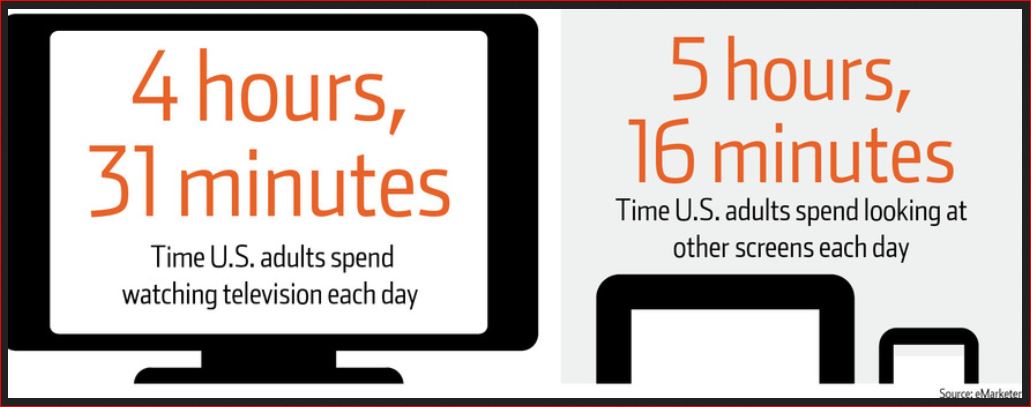
1. You are 44 years old, and are raising young children now. Can you describe the media environment of your home.
Hal: We have one television in the living room, and the kids watch TV usually for an hour after school and on the mornings in the weekend. Otherwise, the tv stays off. They are both also very interested in computer games on any electronic device - desktops, laptops, phones, tablets.
Increasingly, that's the bigger challenge, since many of those devices float around the house and they can pick them up and start playing something or watching something even when they're not supposed to.
2. Please describe the media environment of your childhood home when you were growing up.
Hal: We were only allowed to watch TV on the weekend, and then it was limited to two hours each day of the weekend. Of course, there was no cable then and even the VCR didn't show up until I was 12, so choice was limited. When I got older we started to have destination viewing of certain shows that we all watched as a family.
3. Can you recall the programs that made the biggest impact on you as a kid? Why?
Hal: I loved super heroes, anything of that ilk. I was fond of the Six Million Dollar Man, Wonder Woman, Spider Man, The Hulk etc. I couldn't get enough of that stuff. When the '80s TV tie-in cartoon revolution came around, I was very into watching He-Man and GI Joe, among others. I also remember watching the Wide World of Disney once a week, maybe Sunday evening, and really anticipating that show.
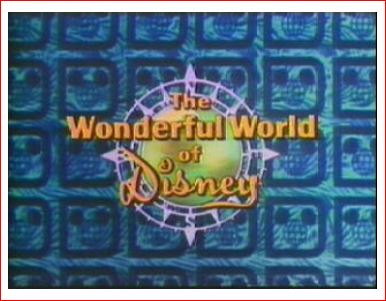
The Wonderful World of Disney logo, circa 1972 (Fair Use).
4. Are you aware of, or have you watched any, of these once popular black & white television programs: 'The Burns and Allen Show', 'I Love Lucy, 'The Jackie Gleason Show' and/or 'American Bandstand'? Why have you watched them?
Hal: Of those shows, the only one that was of my time that I remembered ever watching was 'I Love Lucy'. That was on quite a bit, probably in syndication. I didn't have much interest in it, but I'd pretty much watch anything if it was on in front of me. The other old classic black and white shows I'm aware of and have seen clips of but have never watched.
5. As a well-educated and literate person, how would you say television today informs your understanding of the world, or, is the 'internet' winning? Explain.
Hal: Television is a very narrow, passive place to get information and its content is shaped largely by commercial concerns. If I want to know what is going on in the world, it would probably be the last place I'd turn to. Generally I read articles online to find out about world events.
At the same time, I think my understanding of the world has been greatly shaped by television in the sense that I believe that much of the outside world seeks to emulate the way television shapes and controls information.
Entire fields dedicated to the control and shaping of information emerged largely because of television, so just because one doesn't necessarily watch television for information about the world, that doesn't mean that television isn't framing in some way or other what news sources we do turn to.
6. When someone from the pre-TV era mentions a pre-TV experience, do you find that you immediately reference their stories to events you might have seen on TV?
Hal: I think everybody does that to some extent, though I would say that my frame of reference for certain events or epochs is more likely to include movies first and foremost, and then books, and then perhaps television shows. Still, TV shapes the way we think of things, perhaps not necessarily by specific event but generally.
I don't think of MASH when I think of the Korean war, but I do probably think of MASH, a show I watched a lot, when I think of war in general. When I think of the '80s in general, I think of certain shows like Cheers. When I think of my grandfather, I think of Hockey Night in Canada, because he was a huge Montreal Canadians fan.
7. For 1st and 2nd gen TV watchers, the arrival of the Beatles to North America, the televised landing on the moon, and the shooting of John F. Kennedy were seminal television events that were not a part of your generation's life experience. Name three televised events that now mark your life experience.
Hal: I don't think I can come up with three. The only one that I've lived through that has been "must watch" television for me was 9/11. I remember a lot of people watching TV when Princess Diana died as well, but I wasn't one of them.
The "events" I remember most are personal: watching Adam West's 'Batman' with my brother on cold weekend mornings, huddled together under a blanket staring at the black and white TV in the basement; watching shows like 'Knight Rider', having major wrestling matches during the commercials and then, as soon as the show came back on, jumping back onto the living room couch as we shouted at each other to stop fighting - "It's on! It's on!"
8. As a parent, what role or responsibility do you feel for either exposing or protecting your children from both television and/or the internet? Have you imposed restrictions? Where do you draw the line to censor?
Hal: The goal from a parental perspective is to have them in front of screens for as little amount each day as possible. I'm not interested in censorship, they can chose to watch whatever they want. For the most part, they like kids stuff so that's what they watch, but if they wanted to watch the news that would be fine with me.
Content is actually much less relevant than people think. What I'm interested in is brain development - studies show that the brain is much less active when you are staring at a screen. When you read your brain lights up, when you play your brain lights up, when you watch TV your brain goes dark. I've explained this to them and at least the older one gets it.
At the same time, I don't want to be a freak about it - I love TV and movies and I want them to learn to appreciate these things as the art forms they can be. So, they watch, sometimes more than they should, but we try to discuss what they're watching and understand how the story gets shaped and why.
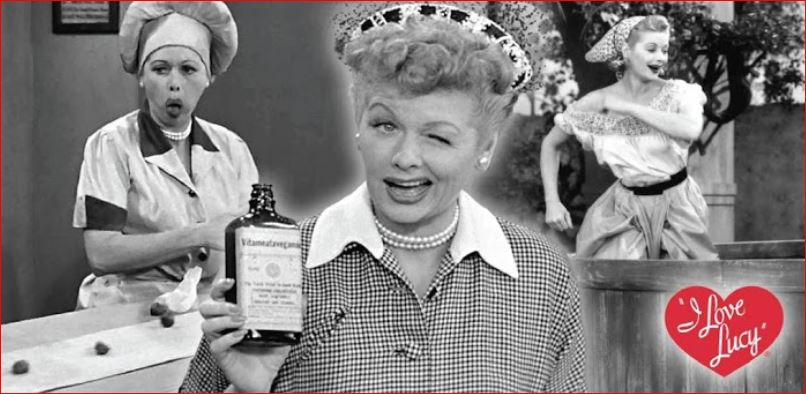
I Love Lucy. Initially aired from 1951 to 1960, a 1st gen program
9. How do you envision the 'media landscape' for your grandchildren?
Hal: While writing my book The Peep Diaries: How We're Learning to Love Watching Ourselves and Our Neighbours, [2009], I became aware of just how much time we're spending in virtual worlds developing parallel virtual selves and communicating with other people's virtual selves. So this is a big part of the media landscape.
Television will be incorporated into the stream of the virtual. We will all be playing ourselves as characters. We already are.
10. How has television shaped your memory? Extrapolate.
Hal: Most of what we think of as memory is actually storing up memories in order to form mental pictures of what is going to happen next. So television greatly expands the bank of images we have in our minds that we use to make assumptions and fill in the gaps of what we don't know about what is to come.
For instance, when we think of a terrorist, images from what we've seen on television pour into our minds. In the 19th century if we thought of a terrorist, we would not have had those images. This makes us vulnerable to easy manipulation; it increases our anxiety and easily overcomes our rationality.
Why are there so many shows about serial killers and other human monsters on TV? I think it's because of how appealing that kind of narrative is to our minds - we want to know what's coming at us, and these shows appear to be telling us what's coming at us, creating "memories" for us that our brains think we can use to extend survival.
But of course these "memories" ultimately produce more anxiety than anything else.
Kindly add any other thoughts that these questions have stimulated about your own television experiences, past or present. What else should we know from your perspective as a 3rd gen watcher?
Hal: In my book We Want Some Too: Underground Desire and the Reinvention of Mass Culture, [2000], I explore how many people of my generation sought some way "in" to the pop culture landscape they grew up with that was dominated by television.
Take the iconic '80s figure Mr. T. In the 90s, a profusion of semi-ironic zines, comics, spoofs and finally web projects featured him. We made so-called underground art that was not a rejection of television and pop culture, but was really a celebration of it.
This kind of creativity represents the power of television over my generation. It is not something that is likely to be repeated. Though we still pay homage and remix culture today, it is more diffuse due to the fact that our pop culture is more diffuse as a result of the internet and profusion of entertainment options.
Without a locus, there are fewer shared cultural moments and TV's power, while still considerable, is noticeably waning.
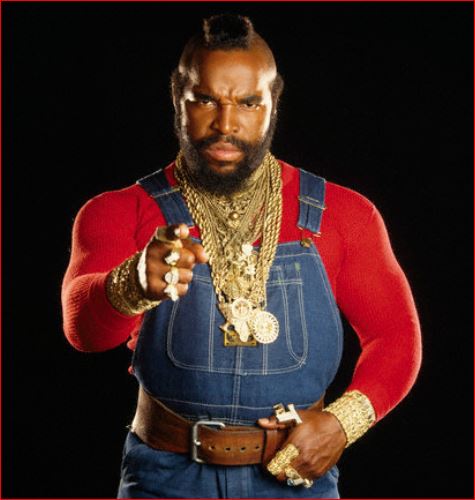
Mister T from The A-Team, aired from 1983-1987, a 4th gen program
Television = Tell A Vision. Today, it's around us daily: at home, at shops, on subway platforms, in cars, on planes, in our hands via portable devices, soon on our wrists and on our spectacles through Apple Watch, Google Glass/Oculus Rift etc., and, in all likelihood, sooner or later, in a body implant as some kind of Transformer-type eyeball.
All in all, it's a startling transitional period that covers, at best, 70 years. In many respects this screen evolution outstrips the societal impact of the industrial revolution.
Think back for a second to the efficiency of distribution of the Kanye/Rihanna/McCartney Youtube video with its nearly 2 billion global screen watchers. That figure represents nearly one third of humanity, all "tuned in" via satellite, wifi or cable in just over two weeks.
Visual information is travelling faster then ever before. Memes and hashtags resonant with millions around the globe in mere milliseconds.
Yet, when we take into account the existing digital divide, compounded by global illiteracy, we suddenly see two very distinct societal tidal waves forming. The digital divide affects nearly 5 billion world-wide, while illiteracy itself is most prevalent in the Arab States, Sub-Saharan Africa and Southwest Asia. There, 774 million adults lack very basic literacy skills, and, worth noting, two thirds of those illiterate adults are women.
Today's digital natives, backed by at least six generations of TV watchers, represent less then one third of humanity, yet they are dominating our species' social sphere, while the latter - by far the greater tsunami of the unconnected - remain mired in poverty and underdevelopment.
A sobering fact: two billion may resonate, in leisure, to a music video seen on any screen, but five billion are still eking out an existence where fresh water, food, shelter. and essential live-saving medicines remain out-of-reach.
It is easy to forget, even ignore, this "unconnected" two-thirds of humanity. They are seldom represented on our screens except as periodic ephemera on the nightly news, usually as victims of some kind of cataclysmic natural disaster.
Not surprisingly, very few screen watchers, even news aficionados, are aware of the ongoing atrocities in Darfur. We may be media rich and savvy, but we are not necessarily getting the total picture of a genuine global reality. It goes without saying that not all the news of today is newsworthy.
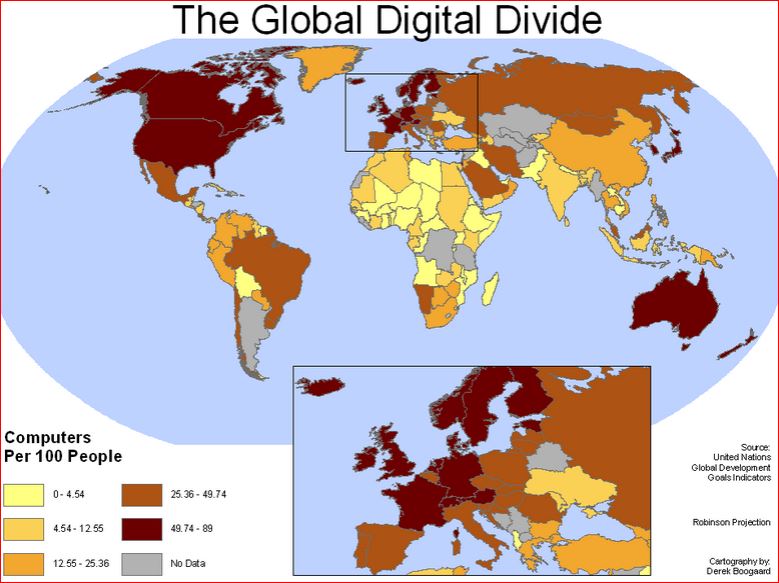
So, where is this media-connected dependency taking us?
Try this, for fun. Step 1. Take 2 minutes, away from this screen, and just think. As you do that, watch - and listen - to your mind as you scat through assorted thoughts and visual images. Can you recognize how often the origin of your associations came from a screen, any screen?
- INTERMISSION -
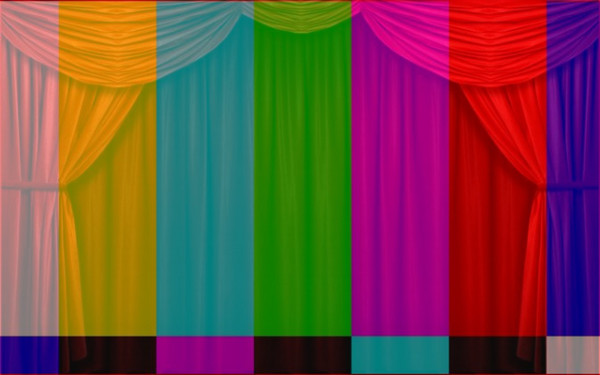
- END INTERMISSION -
Now, Step 2. Consider the speed in which your mind is editing those imaginations and thoughts as it ricochets from point to point. Speed may vary, but fundamentally, these fast-darting thoughts remain as continuity edits in the moving pictures within our minds.
Step 3. Editing is a relatively recent phenomenon. Now, consider this short and handy six-minute video about the History of Film Editing. It kind of represent what is happening in your brain on an on-going basis. Note too, that 'editing' is gender-specific as this insightful and cheeky video amply demonstrates.
How many thoughts, really, are of our own making these days? And does it really matter anymore? Have we, in the developed First World, finally become the Borg where any and all Resistance is Futile?
Or, are all our media choices really just a manifestation of predominately six global corporations who continue to sell us their profit-oriented versions of reality?
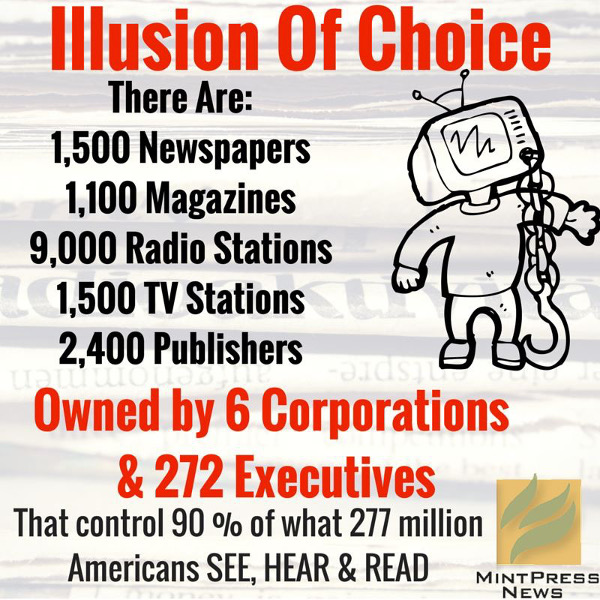
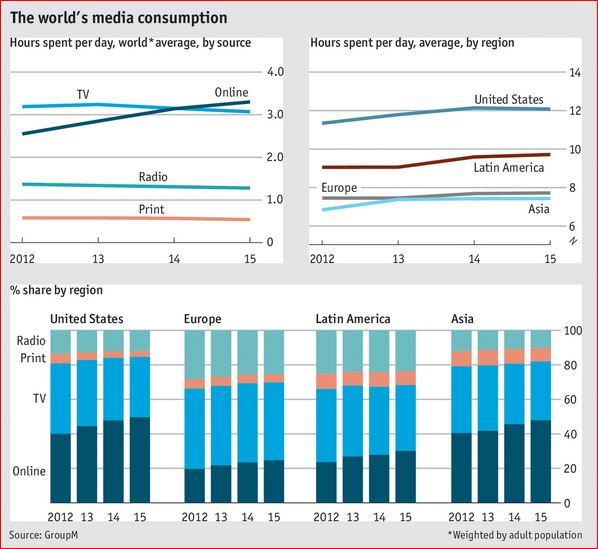
The world's media consumption
Plato, famed Greek philosopher, recounting the words of the revered oral teacher, Socrates, once wrote, "The unexamined life is not worth living."
Socrates' words are especially poignant when we consider that the rest of humanity, over 5 billion living breathing human souls, still don't have the basic necessities of life. They will never have any 'connection' to the passing amusing antics of 'MASH' or 'Charlie Chaplin'.
Their histories, or memory maps, are not our history. And our history, or memory maps, are not their history. We live in two very separate worlds estranged from each other by far more then just technology and money.
As a final illustration of this growing social and humanitarian schism, several decades ago I passed by an an illiterate rural pilgrim outside of a monastery near Kiev. When we looked into each other's eyes there was absolutely no human recognition. There was not one glimmer of understanding. His human eyes were unfathomable to me. I just could not see or read him. We didn't click.
I have no idea, to this day, what he saw when he looked into my eyes. I have no idea what I kind of human I presented to him. We did not speak a word. He did not beg. I did not give a thing. We just looked very hard at each other, and then we both walked on into our separate and very different realities.
It has been my aim to stimulate and engage your thoughts about how the fabricated, edited and artificial world of television - and, by extension, all 'screen media' - have shaped, and continue to shape our life, our life experiences and our life choices.
When we do lose our pre-TV generation, we could well lose our only remaining link with those who continue to exist on the planet far outside the all-enveloping addicting realm of 'screens'.
... Just think about that.
Some handy reference links to help you further explore this topic on your own via the internet:
And, to wrap up, from the United Nations Millennium Goals initiative:
By Missy2013 (registered) - website | Posted May 13, 2015 at 15:55:50
It certainly is a big ol' mess Ryan, and it does seem, in our culture anyway, that its influence is akin to the transformative impact of the automobile, moreover then that of moveable type ... It is almost brutal how it permeates just about every aspect of our daily lives now, from things as simple as banking and placing a phone call to standing in a variety store while the behind-the-counter 'big screen' pumps advertising in our eyes and ears .... For those who do not (and cannot) separate themselves, this ocean of media IS 'Reality', more so then what is Real. It intrigues me, as example, that some are better able to define, name and identify with programme series fictional characters in inventive and intricate plot-lines, then they are aware of the differences, and practical uses, of an oak or an ash tree. .... It's this pervasive intrusion into our minds-eye that's increasingly insidious. Worth asking, what percentage of our respective 'memories' now are residuals of decades of accumulated 'screen culture'? I'd say it's easily 30-40%. There's hardly any way to 'get away' from it anymore, by choice, in our culture. .... And yet, conversely, BILLIONS around the world, who are 'not connected' in any way, envy and aspire towards the 'utopian visions' projected by our available technologies. A Chinese teenager sells his organs for an iPhone and iPad. An African woman sells her blood almost to the point of collapse in order to get a television for her family ... These people are desperate to 'get it'. They desire to 'belong' to a hitherto inaccessible world of 'progress', 'modernity' and 'commerce'. It is considered a route to better their lives, even if it means getting it with a sacrifice of a kind that is certainly difficult for us, in the developed First World, to imagine, let alone consider. Who would go to such lengths to gain 'access' to the 'screen world' when we are so fully immersed already? Only addicts. ... A few years ago I took part in a government-generated Copyright forum that was discussing 'content' on the internet. I was particularly struck by one participant's admission that he would "panic" if he did not have 'internet' access. That remark spoke volumes to the addictive nature of his 'screen time' engagement. He, and many many others like him, might be willing to sell his blood ... Altogether tell-a-vision is most certainly "transforming people's relationships to information, knowledge, memory" and "TIME." .... As to whether or not it will transform 'our' relationship to existing 'control' structures, I don't know about that. Arab Spring is one thing, but Disney is quite another. Corporations and governments overshadow both. (Note, the Disney logo I used in the article was the only one I could find on the net that was not 'legally protected' by Disney. They seem particularly aggressive about 'Copyright' and protecting their 'brand'. ) .... Access to 'screen culture' is controlled, fundamentally, by manufacturers, and, as you've rightly noted, if the technology changes too rapidly before users can adapt, it will result in confusion, frustration and possibly even backlash in rejection and/or violence. Some have lower thresholds then others.... #Gamergate is one such 'reaction' to change. ... Yes, the meme mash-ups continue .... McLuhan remarked, "We become what we behold". Right now, a projected 'FREE-for-all' masquerades alarmingly rigid structures worth billions of dollars that operate most efficiently with minds on Wall Street, then minds on Main Street. We are the cattle, they are the 'herders'.
By Missy2013 (registered) - website | Posted May 13, 2015 at 18:13:46
p.s. I am reminded of a comment made by Bill Gates in conversation with Warren Buffett some years ago, Buffett was wondering why Gates was giving away 'free' software to China. Gates answered, paraphrasing, 'because in 10 years, they'll be addicted' and 'we'll collect sometime after that' .... http://news.cnet.com/2100-1023-212942.ht...
By Missy2013 (registered) - website | Posted May 17, 2015 at 15:41:49
Received this interesting perspective ... " .... mobile computing and the Internet as we know it will be displaced by technology that hasn't been invented yet. Virtual reality and brain wave interaction, combined with anticipatory, experience-based predictive artificial intelligence will be commonplace within ten years. How all of this is used to disseminate information by commercial interests will be a matter of great debate. Self-driving cars are here now. Autonomous fighting machines are already in use by the U.S. military. Humans are being displaced by technology at an alarming rate. At some point this will become an economic issue when there are not enough jobs to go around ... " ~ There are signs of that & more to come like it now.
By Missy2013 (registered) - website | Posted June 03, 2015 at 07:46:57
Afterthought.
Mark Zuckerberg, founder of Facebook (with 1 billion+ users), has developed a platform to bring the internet (with limited functionality & 'data') to the 2/3rds of humanity who dont have it, via https://internet.org/ .
Budding altruistic software developers are invited to 'get involved', here: https://internet.org/platform
Somewhat ironically, Zuckerberg recently established an old fashioned book club where readers are invited to read one book, suggested by him, every two weeks.
Here's the list to date: http://www.telegraph.co.uk/technology/ma...
or, join the group on Facebook, here: https://facebook.com/ayearofbooks
Again, somewhat ironically, the 2/3s without internet access clearly dont have any access to the books listed! But, even with limited access, (and with limited reading skills), there are now audio versions of most titles he is suggesting. (...kind of a mini throw-back to 'oral culture' here ...) They'll just need someone else with the skills to 'plug them in'. Someone else has to teach them how to use the 'screen'.
Developing the basic skills to navigate the signs & signals of the 'screen', mostly by cellphone, is Step 1 towards full-on 'integration' into experiencing life through screens, as we, "the privileged", do.
By Missy2013 (registered) - website | Posted June 03, 2015 at 08:53:02
ps ~ Ryan, this link is for you. :)
TV’s ‘Golden Age’ Won’t Last Because ... You’re Not Watching Enough By Gerry Smith ~ http://bloom.bg/1PP2P3g
By Missy2013 (registered) - website | Posted June 26, 2015 at 10:21:40
And the 'convergence' continues ...
By Missy2013 (registered) - website | Posted July 03, 2015 at 14:32:10
Tangentially, this ...
It's difficult sometimes to appreciate that our wireless & digital 'screen' worlds have actual brown-dirt physical properties (and mammoth land-based servers). It's equally as difficult to comprehend that, as of last Wednesday, the net 'officially' ran out of IP addresses ... Not that this will slow down or stop our 'adapting' to 'screen' technology. It's just an insightful little reminder (again) of the magnitude of this unprecedented cultural 'shift' ~ and our perferred eyeball orientation ...
By Missy2013 (registered) - website | Posted July 22, 2015 at 14:31:31
Google's Youtube is going after 'linear' TV advertising sponsors ...
By Missy2013 (registered) - website | Posted August 27, 2015 at 04:24:45
Update from the mobile sphere ~ percentages / focus & most important, screen content ... http://yahoodevelopers.tumblr.com/post/1...
By Missy2013 (registered) - website | Posted August 27, 2015 at 12:49:20
And, big media merchants are now targeting kids with specialty 'streaming' programming ...
By Missy2013 (registered) - website | Posted February 04, 2016 at 03:39:25
... poignant sidebar afterthought & insightful commentary about the future by cultural 'curator'~ Hans Ulrich Obrist ~
What is the Future of Art? ~
By Missy2013 (registered) - website | Posted August 26, 2016 at 19:49:47
. Donald Trump IS Going To Be Elected. Why? ~ Rosenblum 'gets it' ... Read on McDuff ... http://www.huffingtonpost.com/michael-ro...
By ergopepsi (registered) | Posted August 27, 2016 at 08:16:22
I started reading this but then realized I've read the same essay countless times over the decades. It's a run of the mill 'Kids These Days' diatribe. They do X more than WE ever did, they do Y less than WE ever did. Yet here we are planning Mars colonies, developing quantum computing and quite frankly living in a world that has never been safer or more peaceful. Still lots of work to do but I have faith in the kids these days.
By Missy2013 (registered) - website | Posted September 05, 2016 at 00:49:29
Yes and no. Certainly we've seen amazing scientific & technological advancements, but, serious social problems are emerging. Consider this recent article: http://nypost.com/2016/08/27/its-digital...
By Missy2013 (registered) - website | Posted November 14, 2016 at 09:44:39
The Failure of the IPad Classroom, via The Walrus ~ http://thewalrus.ca/the-failure-of-the-i...
By Missy2013 (registered) - website | Posted March 27, 2017 at 08:17:45
Brain Pickings presents two thought-provoking articles on neurosurgeon & author, Leonard Shlain. Both items contribute to continued studies of the malleability and potential of the human brain ...
First up, Leonardo's Brain ~ https://www.brainpickings.org/2014/11/17...
and then ~ How the Invention of the Alphabet Usurped Female Power in Society and Sparked the Rise of Patriarchy in Human Culture https://www.brainpickings.org/2014/03/17...
By Missy2013 (registered) - website | Posted April 04, 2017 at 15:34:50
Another resource article - https://handsonotrehab.com/screen-time-b...
By Missy2013 (registered) - website | Posted April 10, 2017 at 06:04:19
'Brain hacking' > Another incisive insight about the increasing dependence & use of 'screen culture'. Explains the addiction: how it works, and what purpose it ultimately serves .... http://www.cbsnews.com/news/brain-hackin...
By Missy2013 (registered) - website | Posted May 08, 2017 at 15:20:52
Another insightful article - How TV - aka screen culture - distracts us ...
By Missy2013 (registered) - website | Posted October 16, 2017 at 08:25:50
Digital Education key, link: https://oecdeducationtoday.blogspot.ca/2...
By Missy2013 (registered) - website | Posted November 04, 2017 at 04:19:11
Two additional links, questioning addiction & safety of cellphones. (Note, no comment, yet, on wearable devices.)
Addicted to your phone? http://www.cbc.ca/player/play/1088065603...
The secret inside your cellphone ~ https://youtu.be/Wm69ik_Qdb8
By Missy2013 (registered) - website | Posted November 08, 2017 at 08:16:42
New add on ~ 'There is something wrong on the internet' identifies the complicity of corporations to promote violence onto infants ... https://medium.com/@jamesbridle/somethin...
By Missy2013 (registered) - website | Posted November 10, 2017 at 12:19:08
Ex-Facebook Chief Warns Site Was Built To Exploit People’s Weaknesses
By Missy2013 (registered) - website | Posted February 16, 2018 at 11:30:46
How to help kids with phone addictions ... https://tvo.org/video/programs/the-agend...
By Missy2013 (registered) - website | Posted October 28, 2019 at 06:09:27
... worth considering ~ Digital Minimalism & “solitude deprivation” > https://www.amazon.ca/Digital-Minimalism...
You must be logged in to comment.
There are no upcoming events right now.
Why not post one?